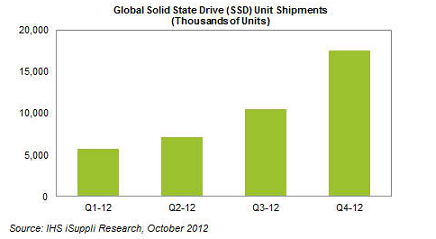Declining PC Sales Not Derailing SSD Market in 2012
With the PC market taking a downward turn in 2012, the SSD market still finds itself on an upward trend
As we reported earlier, IHS iSuppli forecast the PC market to have a 1.2 percent decline in 2012, which will be the first decline in 11 years. With the diversified of SSDs, its growth outlook has only decreased slightly, even with the ultrabook shipments being behind expectations and the sobering outlooks provided by Intel and AMD.
SSD shipments in the first half of this year amounted to 12.9 million units, according to IHS iSuppli. Shipments reached 10.5 million in the third quarter and will rise to 17.5 million units in the fourth quarter, for a total of 28.0 million units in the second half. This is down from the previous forecast of 13.0 million in the third quarter and 20.0 million in the fourth. Even though the units shipped didn't meet expectations, it is still double the total number shipped during the first half of the year.
The shipment date provided by IHS cover pure standalone SSDs as well as drives that are used with HDDs as separate cache entities. The numbers cover all applications for SSDs, including but not limited to the enterprise segment, ultrabooks and consumer units.
The long-term outlook of SSDs still holds a positive position due to improvements like NAND die shrinks, increasing utilization of TLC flash, and more efficient controllers that are accelerating the cost curve. Information collected by ISH showed the second quarter of the year closed with 7.1 million SSDs being shipped for $1.5 billion in revenue. In addition, IHS predicts that by the second half of this decade, SSDs with be the standard storage in non-budget notebook and desktop PCs, thanks to a mixture of lower prices, consumer education and an optimized software ecosystem.
IHS projects the SSD industry will finish 2012 with $7.5 billion in revenue and 41.0 million in shipments, with compound annual growth rates of 35 percent in revenue and 69 percent in shipments.
Contact Us for News Tips, Corrections and Feedback
Get Tom's Hardware's best news and in-depth reviews, straight to your inbox.
-
wintermint This isn't surprising at all. SSD is becoming a cheap easy way to upgrade a computer. The gb to price ratio have slowly and surely turned to the consumer's favor.Reply -
captainblacko doesn't surprise me. I bought my first SSD a few months back for my work laptop to help extend its life and I'd imagine most people are doing the same as the performance benefits out weigh the cost of buying a new machine.Reply
the laptop in question is a HP DV8 fitted with a cheap OCZ agility3 120GB SSD.
-
blubbey Not surprising at all. They're becoming more affordable and more available. Good chance of it becoming a standard boot drive in a few years perhaps?Reply -
captainblacko blubbeyNot surprising at all. They're becoming more affordable and more available. Good chance of it becoming a standard boot drive in a few years perhaps?Reply
i believe so.
I also think if the PC market goes the way its going and they push the ITX form factor we may end up with motherboards coming out with SSD's soldered onto the boards which can be used as cache drives. -
Miharu Not suprise at all.Reply
SSD are cheap.
For the PC sale declining no suprise. They try to sell you a $600-650 laptop for $1,400 telling you it's because it's SLIM. Everybody want slim laptop but no one want to pay so much for a laptop WITHOUT any nvidia/ati videocard. Just check the new HP Envy that you have see in a pub at the theater.... $1,400 bucks!!!
At the end, they also raised their $600-650 not slim model for $900.
So you think it twice before buy one.
HP, Lenovo, Dell,.... Declining sales but they make more profit by sale. They choice this path. So this probably change nothing for them.
And a desktop cost almost the same price as before... and you don't need right now to change it.
-
deksman It is also cheaper for people to simply buy individual components that might have a profound impact on performance compared to full blown computers.Reply
As for PC sales slowing down - this is not solely due to hardware exceeding software demands. Its also tied in predominantly with automation taking over and companies finding it more cost-effective (not to mention efficient) compared to human labor (which they are finding increasingly harder to justify).
From a technological/resource point of view, this could have been done decades ago, but since we live in an economy where money and cost dictate everything, companies wait until technologies become cheap enough for them to implement (which they will do mainly if they see they can profit from it).
But, the amount of people losing their jobs is increasing in speed - purchasing power is only going to go further down, and people won't be able to re-educate themselves to do something else fast enough because technology will outpace them (we cannot 'compete' with machines in this).
In numerous situations, 3d design based software can easily push existing hardware to its limits and far beyond - and with the advent in 3d printers, such software is likely to become increasingly more commonplace.
-
ojas Graph says "thousands of units", but the article's quotes are in millions. Which one's the typo?Reply -
jrharbort I remember exactly 4 years ago when I was looking at 128GB SSDs for around $400. The speeds were around 135MB/s reads, and 80MB/s writes. Now you can grab one today for as low as $80 with MUCH higher speeds, as well as vastly superior IOPS performance.Reply
